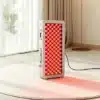Household Products You Should Avoid If You’re An Asthma Patient
About 25 million Americans have asthma, a condition that makes it difficult to breathe and causes chest pain. Chemicals found in household products can trigger attacks. Here are a few to look out for.
1. Wood Smoke
Sitting by a wood-burning fire may seem cozy, but it can actually trigger an asthma attack. Wood smoke contains harmful compounds like carbon monoxide, volatile organic compounds, and nitrogen oxides, along with hazardous air pollutants such as benzene and formaldehyde. These tiny particles can penetrate deep into your lungs, leading to coughing and wheezing. To reduce the risk, consider opening windows, using a grate, and having a smaller fire.
Wood smoke can also come from stoves and heaters. Switching to natural gas appliances or using solar stoves can be better alternatives that are safer for individuals with asthma.
2. Scented Perfume
While wearing perfume can be enjoyable and refreshing, it can be a potential trigger for asthma patients. The particles in perfume may inflame and narrow the airways, leading to discomfort. Strong fragrances have been associated with asthma attacks.
If someone in your household has asthma, it might be wise to avoid using heavily scented perfumes. Consider using alternatives like unscented body lotions and deodorants.

3. Fresh Paint
Painting your home can be a creative way to express yourself, but the strong fumes from fresh paint can irritate the skin, eyes, and lungs. These fumes contain volatile organic compounds (VOCs) known to trigger asthma symptoms. Some VOCs can even lead to serious health conditions, including heart disease.
Look for paints with low VOC content from reputable brands like Benjamin Moore or Sherwin Williams to minimize health risks associated with painting projects.
4. Aerosol Sprays
Aerosol sprays like hair spray, cleaners, and room deodorizers release chemicals like leukotrienes and histamines that can increase mucus production and lung inflammation, particularly in individuals with asthma.
Instead of using aerosol sprays, opt for natural alternatives like a mixture of cornstarch and water for deodorizing clothes. These alternatives are gentler on the respiratory system and the environment.
5. Household Cleaners
Chemical cleaners are commonly used to tackle tough stains, but their ingredients can trigger asthma symptoms in susceptible individuals. These cleaning agents can induce a hypersensitive immune response and directly irritate the lungs.
Examples of common compounds found in household cleaners include:
- Bleaches: Strong oxidizers with deodorizing and disinfectant properties.
- Quaternary ammonium compounds: Used in cosmetics and pharmaceuticals as preservatives.
- Aldehyde disinfectants: Industrial and medical disinfectants or preservatives in cosmetics.
Reduce asthma triggers by using fewer chemical cleaners, relying more on soap and water, cleaning in well-ventilated areas, and avoiding mixing cleaning products.

6. Detergents
Even though detergents are essential for cleaning laundry and dishes, some contain formaldehyde, a skin irritant that can trigger asthma symptoms like coughing, wheezing, and throat irritation. Some detergents also contain strong fragrances that can be problematic for asthma patients. Consider using alternative cleaning products like baking soda, borax, oxygen bleach, shampoo, or bar soap.
7. Air Fresheners
While air fresheners may add a pleasant scent to your home, they often contain VOCs that can exacerbate asthma symptoms. Prolonged exposure to these chemicals can lead to respiratory tract irritation, headaches, and dizziness. Be cautious of air fresheners containing VOCs like formaldehyde, petroleum distillates, and limonene.
Explore natural alternatives like essential oils, houseplants, or potpourri to keep your living space fragrant and asthma-friendly.
Keep Your Family Healthy
Many household products harbor pollutants that can trigger asthma attacks. It’s crucial to opt for more natural and asthma-friendly products to safeguard your health and the environment. Thankfully, there are plenty of alternatives that are safer for individuals with asthma and contribute to a healthier home environment.












